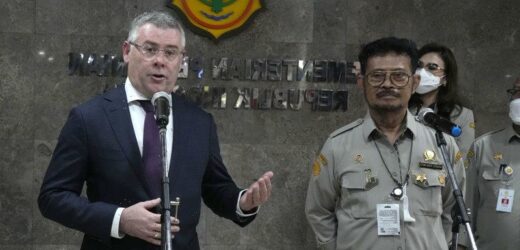The devastating foot and mouth disease, which threatens to decimate Australia’s livestock industry, has been detected in goods coming into Australia from both Indonesia and China.
Foot and mouth disease infects cloven-hoofed animals and does not affect the health of humans. It can be carried on animal products including meat and leather and people can carry it on their shoes, clothes or in their noses, where it can survive for up to 24 hours.
Federal Agriculture Minister Murray Watt with his Indonesian counterpart Syahrul Yasin Limpo during a joint press conference in Jakarta, Indonesia last week.Credit:AP Photo/Tatan Syuflana
If one positive case of foot and mouth were detected on an Australian farm it could shut the $27 billion livestock export trade down for months or even years. The federal government has estimated the total cost of a major outbreak at $80 billion
Agriculture Minister Murray Watt revealed on Wednesday that a beef product containing the foot and mouth disease virus had been detected at an Australian airport, brought by a passenger from Indonesia.
Pork products that were for sale in the Melbourne CBD were also found during routine inspections to be infected with both foot and mouth disease and African swine fever – another livestock disease that has not previously circulated among animals in Australia.
“We have detected Foot and Mouth Disease and African swine fever viral fragments in a small number of pork products for sale in the Melbourne CBD that were imported from China,” Watt said on Wednesday.
“Several other pork products for retail sale have tested positive for African swine fever viral fragments.
“I’m advised that all products now of this kind have been seized from all linked supermarkets and a warehouse in Melbourne as well.
“In addition to this, a passenger travelling from Indonesia has in recent days been intercepted with a beef product that they didn’t declare, which tested positive for Foot and Mouth Disease viral fragments.”
An outbreak on Indonesia’s main island of Java has spread to the popular tourist island of Bali, which is visited by more than 1 million Australians a year, ramping up the risk of a first-ever outbreak Down Under.
Watt said that government experts had advised him that animal products posed the biggest risk of incursion, and said it was a positive sign the infected beef and pork products had been detected.
“These detections show that our borders are strong and that our biosecurity systems are working,” he said.
Foot and mouth infects domesticated farm species such as pigs, cattle and sheep, as well as feral species, including camels, pigs, goats and deer. It causes fever, lameness, and lesions on the tongue, feet, snout, and teats.
The virus is highly infectious, spreads rapidly among livestock and can survive on objects like vehicle tyres, livestock trucks and equipment.
The 2001 outbreak of foot and mouth in the UK forced the destruction of more than 6 million pigs, cows and sheep at an estimated cost of £8 billion ($14 billion).
Cut through the noise of federal politics with news, views and expert analysis from Jacqueline Maley. Subscribers can sign up to our weekly Inside Politics newsletter here.
Most Viewed in Politics
From our partners
Source: Read Full Article



